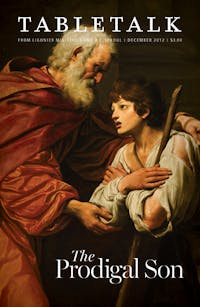
Request your free, three-month trial to Tabletalk magazine. You’ll receive the print issue monthly and gain immediate digital access to decades of archives. This trial is risk-free. No credit card required.
Try Tabletalk NowAlready receive Tabletalk magazine every month?
Verify your email address to gain unlimited access.
One of our Scottish preachers used to say that the believer has three looks at the Lord’s Table. There is, first, a retrospective look. The sacrament of the Lord’s Supper is a commemoration, a celebration of an event in the past. It is an aid to us in remembering the pivotal, redemptive point of history, the point at which the Son of God died for his people. It is not a re-enactment of the sacrifice, but it is a dramatic visual aid to faith as it looks back over history to the point at which the sacrificial lamb died for us.
Second, there is a prospective look in the sacrament. It looks forward as surely as it looks back. It anticipates the return of the Lord. It belongs to the design of the Lord’s Supper that it is a temporary arrangement “till he comes.” The bride of Christ does not remember the death of her bridegroom as a widow but as one who longs for the day when the bridegroom will return to take her home.
But, third, there must be an introspective look in the sacrament. We are called to look inward as we participate, to prepare for the Lord’s Table by examining ourselves. We are not called to be self-obsessed, but we are called to be self-aware, to bring ourselves under the scrutiny of God’s Word even as God’s Word invites us to come to the feast.
In 1 Corinthians 11:27–28, self-examination is required if we are to avoid being “guilty concerning the body and blood of the Lord.” The guilt of which Paul speaks is connected with eating the bread or drinking the cup “in an unworthy manner.” Self-examination is motivated by a desire for God’s glory in our participation in the sacrament, that we may eat and drink “worthily.”
The “worthiness” of which Paul speaks is adverbial, not adjectival. That is, it does not describe the people who participate but the manner in which they do so. We are all, every one of us, unworthy of the love that invites us to the Lord’s Table. We do not examine ourselves to see whether we are worthy or whether we have done anything to make us more worthy since last we participated in the sacrament. But we do examine ourselves to make sure that our eating and drinking are worthy, that we have a title and a right to be at the table, and that our taking the bread and wine is appropriate and fitting.
To that end, we need to ask, for whom has the sacrament been prepared? The answer to that question is that it has been prepared for the friends of Jesus: “You are my friends,” He says to His disciples, “if you do what I command you” (John 15:14).
Here is a standard by which we may examine our fittingness to share in the sacrament, to eat the bread and drink the wine. Are we the friends of Jesus? Do we have things in common with Him, the way friends do? Is His glory our great interest? Is His saving work at Calvary our only hope? Are His death and resurrection the foundation of our entire lives?
Friends share secrets with each other. It would be strange indeed if friends never talked and never communicated. True friendship likes to give expression to deepest longings and most intimate thoughts. The friends of Jesus are no different. He has spoken to them in His Word, revealing to them the desires of His heart. They respond to Him in prayer and in praise, sharing all their interests with him. With David they say, “O Lord, all my longing is before you; my sighing is not hidden from you (Ps. 38:9).
Friends also look out for each other. The friends of Jesus love to guard His name and reputation. They love to do what is right and to obey His commands. Their obedience and service are not the basis of their worthy participation in the sacrament, for they know that they come woefully short even in their attempts to serve Him. But their worthy eating and drinking relate to the desire they have in their souls to love Jesus more than they do and obey Him as He deserves.
So, I may come to the Lord’s Table overwhelmed by a sense of my unworthiness, broken by a sense of my sin, mourning because of my disobedience. But none of these is sufficient to keep me away if, in my heart, I know that the death of the Passover Lamb is my only hope and that Jesus is still my best friend.
I know of no better expression of this than the response of the Heidelberg Catechism to the question “For whom is the Lord’s Supper instituted?” the first part of which reads as follows:
For those who are truly sorrowful for their sins, and yet trust that these are forgiven them for the sake of Christ, and that their remaining infirmities are covered by his passion and death, and who also earnestly desire to have their faith more and more strengthened, and their lives more holy.
If, as we examine our hearts, we too can find these longings in our souls, then the Master of the feast says to us, “Eat, O friends, drink, yea drink abundantly, O beloved!” (Song 5:1, KJV).
